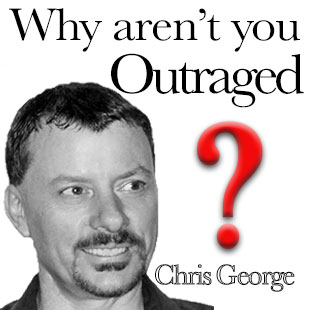
(CHRIS GEORGE / iNFOnews.ca)
April 24, 2018 - 12:00 PM
OPINION
Earth Day is one of the times when I post my favourite definition of sustainability on Facebook. I feel that it is important to remind people that the lives we lead are about as far from being sustainable as it is possible to get. Most people at least get it and think about the thousands of little things they can do in their lives to be even a little bit more sustainable. Some pass the entire idea off as unachievable and move on.
Some simply don't understand the point at all. This year a friend of mine even asked: "and just why should Canadians care?" Canadians should care, just as every passenger on Spaceship Earth should care; to make sure that our children and grandchildren aren't presented with the bill for our not caring.
Sustainability is a lens through which we can choose to look at the world. It applies to our social relationships, our political economy, and of course, the life support systems of our planet. Very few people choose to do so. It is difficult. The idea runs counter to a number of cultural narratives. Sustainability implies control; over one's life to begin with and then as members of a global society. It is easy to think that going up against systemic greed and envy is pointless, that one person's small contributions couldn't possibly matter. It is much harder to truly embrace the idea and find small ways to be more sustainable, even as the entire system around us continues to make the very notion unimaginable.
Small choices matter. Changing our thinking matters. Teaching our children to see that there are other ways of thinking and being matters. The sooner that people get the idea that cooperation with the constraints of life on planet Earth is the only viable long-term strategy, the more of the planetary ecosystem we can potentially keep intact for future generations. I realize that concern for people who are not me, not now, or not here is not the ethical position that our culture promotes, but it is the only position that matters in the long run.
An argument I often see against sustainability is the argument from comparison, or what I like to call the child molester defence. When confronted with anything that might require a behaviour change or a perceived sacrifice of any kind, some people will point out that somewhere else on the planet are people (and usually many more of them) who do whatever the topic of discussion is, but only more so than us. Thus we shouldn't worry about changing our own behaviour. In short, "...sure, we molest children, but look at that guy over there! He molests hundreds more than we do. Go after him, not us!"
It is a meaningless argument, but it certainly is prevalent.
Five years ago an article on Grist made the point that traditional industries were all economically unsustainable. They burn through natural capital like an unsupervised trust fund and call it wealth creation, prosperity, and when they need buy-in from the rest of us, jobs. This isn't an accident. It is systemic, supported by public institutions, governments, and the corporations who increasingly seem to be running them. Sustainability has no part in this type of thinking, with predictable results.
I often make an argument from political economy in defence of the natural world. A position that I hold firmly is that an entrepreneur is the fundamental building block of wealth creation. I also hold that an unsustainable business cheapens the very values that underpin the idea of entrepreneurship. We know we can pick wealth up off the ground and convert it into money in the bank. We know we can leave the true economic, social, and environmental costs behind us for someone else to pay for, usually the taxpayers of the day.
But can we truly create wealth and value that way? Finding creative ways to steal from people who are not me, not now, or not here may be the norm, but is it right? Is it something that Canadians should care about?
I think it is. But I also know that the only way to eat this particular elephant will require many small bites from many, many people. Small choices for sustainability matter. Make one today.
Happy Earth Day
— Chris George believes one measure of a just society is found in how well it balances fiscally conservative economics with social responsibility and environmental soundness in all of its living arrangements.
We welcome your comments and opinions on our stories but play nice. We won't censor or delete comments unless they contain off-topic statements or links, unnecessary vulgarity, false facts, spam or obviously fake profiles. If you have any concerns about what you see in comments, email the editor.
News from © iNFOnews, 2018